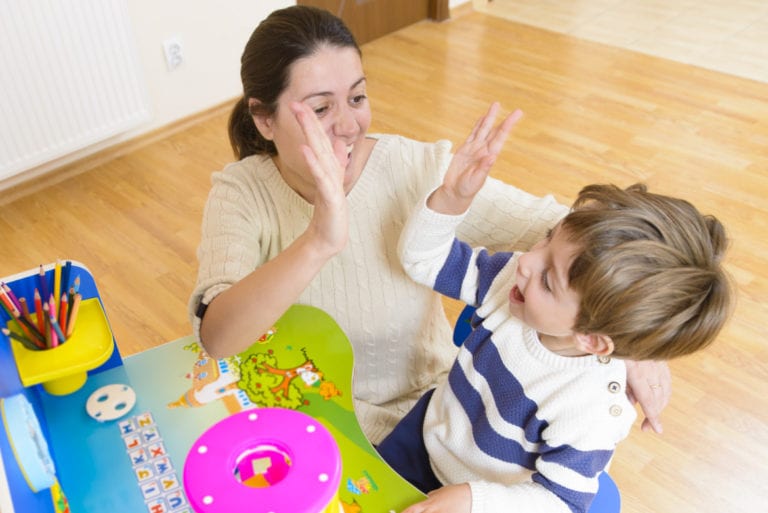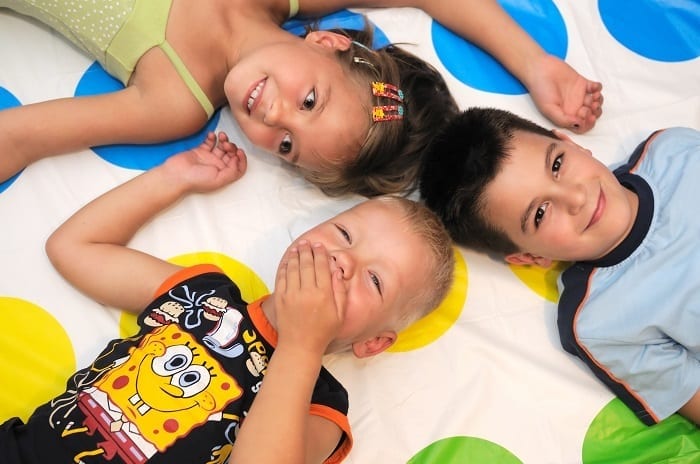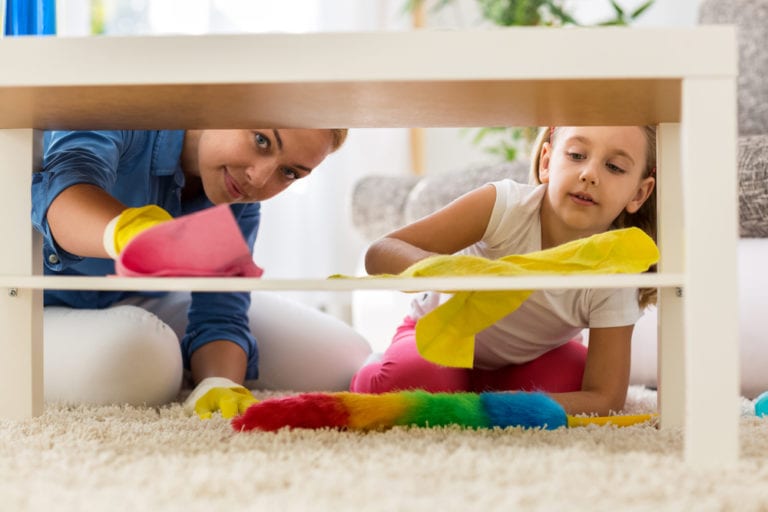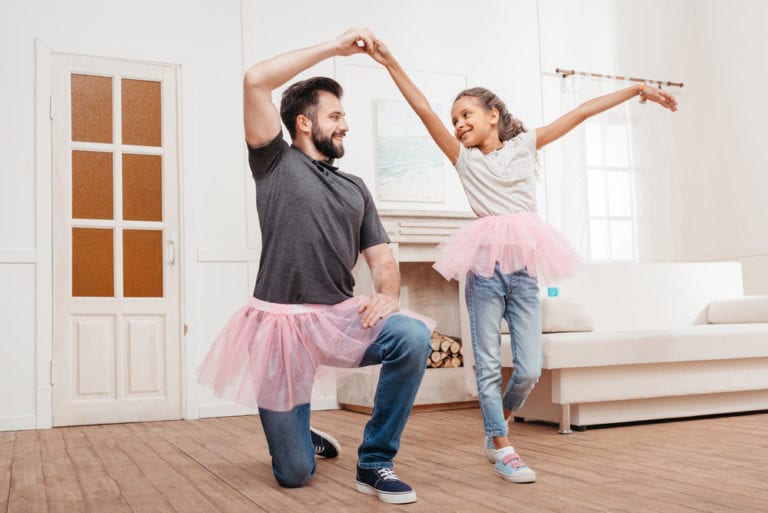5 Essential Tips on How to Talk to Your Kids So They Will Really Listen
Disclosure: This post may contain affiliate links, meaning I may get a small commission if you decide to make a purchase through my links, at no cost to you.

How to talk to your kids so they will really listen is an important skill for both parents and children, as it can help foster a closer relationship and open the communication in the family. If you have teenagers, then you know how difficult it can be to get your kids to talk and listen.
There is a saying that goes, no one cares how much you know until they know how much you care. Kids learn how to listen and develop communication skills when parents start paying attention to their children, spend quality time with their children as well as one on one time with each child individually.
Even older kids who seem to lack good manners, feel worried, or lack problem solving skills, will develop self discipline when parents and family members come together and have more conversation time through family meetings, sharing stories and personal experiences, involving children in family time, and other family acivities. We should genuinely be interested in our children’s lives.
At home, parents should create a safe place where respect is freely given, a place where each parent is a good listener, where parents encourage ideas, and where each of their children matter. When our child’s life is a priority and when we act, listen, use eye contact, positive body language, teach, and give our children our full attention, we will develop lasting relationships and give each child a message that you are listening and are interested in their lives.
Why Should We Talk to Our Kids with Respect?

You teenager comes home from school throws his backpack on the floor, grunts something to you when you ask how school went and dissappears into his bedroom until you call him to the kitchen to help make dinner. This happens on an almost daily basis. If our kids are rude and disrespectful does that deserve a similar response from us?
Kids will listen to your ideas, and talk to you with respect when you show them, and share the message that they are more important no matter how they behave. That they matter. Be an example of good behavior, positive body language, encouragement and love. If you do this, you will will be a better influence than your child’s school teachers, work relationships, peers and even friends.
Parenting today is challenging! Talking to our kids and getting children to listen is more difficult today than ever before. Like in other countries and in the past, children have a roller coaster of emotions at every age. However, in school today, the demands to succeed are endless and even more important than just a decade ago. It is a truly competive world we live in now.
And with competitiion comes stress, anxiety, lack of self esteem and they lose themselves and their identity. In trying to fit in or feel a sense of belonging they turn to friends and search for themselves. They become curious about their own sexual identity, new friends, drugs, alchohol and more. Your child is desperate for acceptance and love.
There is the endless distractions in a child’s life with social media, school work, other relationships with friends, coworkers, and teachers. Then there is the constant bombardment of our child comparing themselves to the seemingly perfect lives of social media influencers, friends, and family. This leaves a child with strong emotions that so happen to hault their ability to cope, communicate, and create a fulfilling and happy life.
Feelings of fear, low self esteem, and poor behavior can be lessened and even eliminated when we give them an opportunity to freely talk, express themselves and even go to their rooms to be alone for a time. Give them space, but not too much space. Talk to them and send them a clear message that you as a parent are in this with them. Kids want to know that you too had challenges when you were a kid. Share your own insecurities and challenges.
It’s no secret that parenting can be tough. There are hundreds of parenting books that talk about how to get your children to listen in theory, or even how to talk to your children by using open ended questions. But in practice it is difficult to know the skills needed to talk at your child’s level so that kids will listen.
As a parent there are a million different things to worry about, and it’s easy to get overwhelmed. One thing that is often overlooked, however, is the importance of how you talk to your kids. The words you use can have a profound effect on your child’s development, relationships, and life. It’s crucial to be mindful of what you say to your child. Positive parenting is a solution to start communicating so kids will listen.
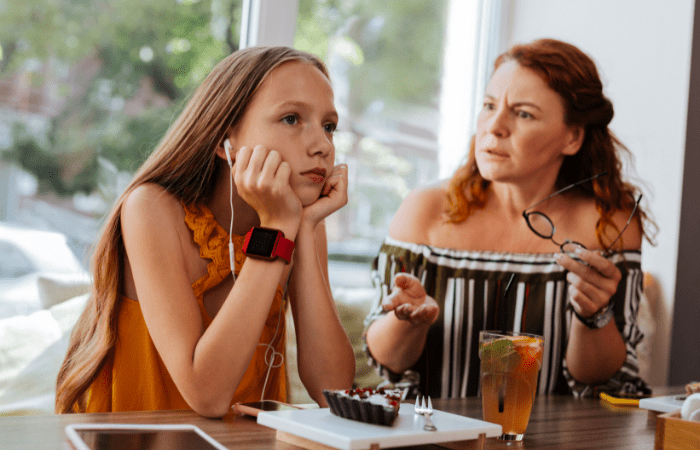
How to Talk to Our Kids When it is So Hard!
If you struggle to have meaningful or really any conversation with your kids you are not alone. Parenting is hard work. Communication is hard work. Listening to parents is also hard work for your child because your daughter doesn’t have the skills to properly communicate her wants, needs, and feelings.
Eight in ten parents say that they feel like their kids avoid having conversations with them and one in four parents say their child will often give short curt answers or even grunts or sighs when parents try to talk to their kids.
It is important for the develop of our kids’ brains to have meaningful and back and forth conversations with each other. Connecting with our children through conversation will also help gain cooperation from our kids. When we can communicate in such a way to get them to not only talk, but listen and comply with requests, our relationship with our kids will thrive. And their brains will be better off for it.
Here are a few ideas and examples on how to talk to your kids so you are heard and heeded!

Don’t use sarcasm or put-downs.
Even if you think you’re being funny, chances are your child will just be confused or hurt by your words. When you use negative language, it can damage your relationship with your children and make it harder for them to trust and confide in you. Be an example of kindness by talking to them, using positive body language and speak using words that encourage and build your kids, not put them down.
When you say something like “how many times have I told you to keep your backpack off the sofa? You weren’t raised in a barn.” The only thing they hear is that they have disappointed you once again and you are back to yelling at them…AGAIN.
Instead, try using words of encouragement. For example, “Will you please put your backpack on the hook in the mud room.” Then “Thank you, I really appreciate your willingness to help me out.” When you speak to your kids with polite and positive language, you are sending the message that you appreciate them. This will help your child feel good about themselves and be more willing to do what is asked the next time.
Be Clear and Concise:
When your child was a baby and then a toddler, one word sentences were all they needed for communication. It’s still important to be clear and concise when talking to your children and older kids. They have shorter attention spans than adults, so long-winded 20 minute explanations on why they need to keep their backpack off the sofa will surely cause them to tune you out and stop listening.
Stick to the point and avoid using jargon or technical terms. Sometimes a simple “Backpack away please” is all that is needed for your kids to get the picture. If you can get your point across in a few simple words and not lectures, children are more likely to understand and comply to what you’ve asked.
Always be Respectful.
Even if your children are misbehaving or testing your patience, it’s important to remain calm and collected. Yelling or berating them will only make the situation worse and could damage their self-esteem. If you find yourself getting angry, take a step back and take a few deep breaths before continuing.
Words of encouragement far outweigh praise when it comes to communicating with our kids. Words like “You’re the best” or “good job” may not sound bad, but they tend to fall flat. Instead consider, “I really appreciate your help with keeping the house clean.” Or “You must be so busy to have forgotten to put your backpack away.” Can you see how words of encouragement help kids develop a higher self-esteem?
Communication is key to any healthy relationship, so make sure you’re taking the time to talk to your kids in a way that will encourages them to listen. Sometimes kids don’t respond simply because they didn’t hear you. Talk to your children using eye contact. Listening is a skill that can develop when we give our kids the ability to use their listening skills.
When you use eye contact with your child, give the request and wait for a response, then you know you have been heard.
Be Present When Talking to Children
As I said above, 8 in 10 parents have a problem communicating with their kids. When it comes to talking to our kids, we want them to listen. We want them to understand what we’re saying, take it to heart, and maybe even do something about it. As parents, it’s important that we pay attention when our kids are talking to us. Make eye contact. Use active listening. Put you phone down. Answer their questions and be an example of a good listener.
Listen to your kids like you would your boss, or supervisor (with your undivided attention.) Kids know when you aren’t listening. Then respond and talk in a positive and approprate way. With kindness and encouragement.

Don’t Yell.
When our kiddos are screaming, misbehaving, and throwing a temper tantrum, we get frustrated and even yell. You don’t plan to yell; you didn’t yell at your class mates, teachers or supervisors (unless you raised your voice in a heated moment that you probably appologized for later).
You raised this adorable and sweet baby and when it became a toddler, that tollerance wained and now when the temper tandrums come so often, you try to stay composed, and then in a moment of exasperation…you break. You have feelings of guilt, shame, and maybe even hopelessness.
Studies have shown that children who grew up in a home where there was consistent yelling were more likely to have anxiety, depression, and other emotional issues, similar to children who are spanked frequently.
Now if your child is about to run into a busy street because their kitty got away then by all means yell. But If we yell ALL THE TIME to communicate requests (because kids won’t listen unless you do), your kids will less likely respond as a way to keep themselves safe.
Now before you go to a therapist because you think you have ruined your child, it is not too late to speak using another way. Your child is resilent and believe it or not a great example of forgiveness.
Try to speak kindly to your child. If you do find yourself yelling at your kids in the heat of the moment, let the dust has settled for a few minutes, and when the situation has had a chance to simmer, then sit down with your child and reconnect. Express your feelings and apologize. Let your child know that you acted inappropriately and you will try do to better. Life is already difficult. We don’t need to beat ourselves up for making mistakes, we can just learn from them.
Model “I Feel” Statements.
This works well especially when trying to reconnect after yelling at your child. For example, “I feel stressed when I see such a mess and don’t have time to clean it up. It would be so helpful for me if you would please make sure you put your backpack away when you get home so we know where everything is.”
Don’t blame them for how you feel by saying “I feel stressed because you put your backpack on the sofa again.” That will only make matters worse. By using “I feel” statements you are modeling appropriate conflict resolution skills for the future. Body language is also important when asking for forgiveness. Hugs are welcomed.
Respond to “Why?” Appropriately
Eliminate “Because I said so”. It is a short and concise answer to a request, but it will fall far from the mark of getting your kids to cooperate and communicate. Children these days are very intelligent, but can be stubborn. Being an authoritarian is not going to work anymore.
You aren’t listening to or obeying a spouse who demands dinner be ready by 6, and therefore your daughter isn’t going to listen to you when you demand she pick up after herself because you said so. When we talk to a child and use communication like “because I said so”, you are sending a clear message to your child that you don’t care about her. Your child is listening to the tone and understanding the tone and not the message.
Try simply explaining to your child why you want her to do a task, chore or anything really. “I need you to get ready for dance practice quickly, so that I have time to stop by the store for treats on the way.” She will race to get ready so that she can enjoy the awaited treat.
“Because I asked you to.” Is also not a good response. Instead “I would love to keep the living room clean, so I need everyone’s help.” When we talk using kind and positive parenting communication skills, our children with respond and the lines of communication will open.
Don’t Freak Out!
Imagine you are in the kitchen, happily making your child’s favorite meal. Your son walks into the house seeming somewhat sullen. You ask him what is wrong. With fear in his voice, he then tells you that he may have broken the neighbor’s dogs leg by swinging a bat at it when the neighborhood kids were playing baseball.
Your first instinct may be to shout “What were you thinking?” Remember this. It took your child a lot of courage come to you and talk about a mistake he made, whether on accident or on purpose. He needs your guidance and direction, not a lecture.
Your response is crucial. Listening to his heart is very important in developing communication skills in your child. Instead consider saying (and practice saying this often) “Thank your for telling me, what can I do to help?”
This will keep him from becoming defensive and instead will more likely open up to you the next time he is in trouble.
This can take a great deal of practice, because all parents want their kids to be model citizens of the community. When kids misbehave, it may seem to reflect poorly on you as a parent and you will want to nip that negative behavior in the bud from the very moment you get the bad news.
Take a step back and remember that you want your child to overcome bad behavior and the best way is to love and support him through it all.
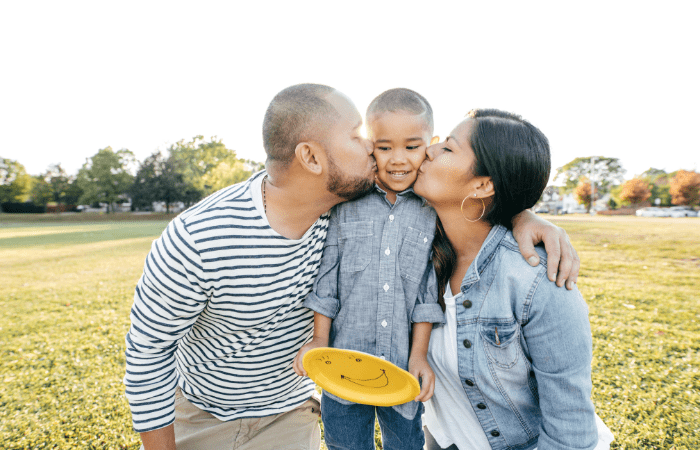
Talk to Your Kids in a More Positive Way Instead
If you have asked your child to do a task in a kind and respectful way, they still may not do it or have an excuse why that backpack didn’t get put on the hook in the mud room, or your teenage son still hasn’t done his math homework and he wants to go hang out with friends. What do you say then?
Remember positive communication with your child is essential in getting him to talk, listen and act in a more appropriate way.
Use “If Then” Statements
Instead of using demands and commands, try saying, “If you put your pack back on the hook in the mud room, then you can finish watch that YouTube video you were enjoying.” Chances are they will do the task with little if any push back.
It is important not to talk using an ultimatum. For example, rather than saying “If you don’t clean your room, then you can’t go outside and play,” try instead “If you please clean your room then we can go outside and play?” This will help avoid a power struggle, and allows for a more positive outcome.
When we give our child an ultimatum, we are essentially telling them that we don’t trust our child or that we don’t believe they are capable of making the right decision. This can damage our relationship and make it difficult for future positive communication to take place.
Use “What is Your Intention?”
Asking your child “What is your intention for cleaning up your room?” or “What is your intention for finishing your math homework” gives them an opportunity to own the task and take responsibility for it getting done.
When positive communications happen consistently, then your child will feel respected be willing to follow through with requests and responsibilities. This empowers kids to take responsibility for their tasks and actions.
Be Consistent and Be Careful Not to Don’t Budge
Common sense shows that kids are strong willed and will want to see how far they can go to get away with doing as little chores as possible or finishing tasks required of them. Not because they are naughty or lazy, it just isn’t important to them. Going outside to play or having fun with another child is what is important to them. So it is important to your child to know why these requests and responsibilities are important to them as well.
It is important to be consistent. If you have asked your child to finish homework before going to a friend’s house then it is settled. Don’t give into nagotiations, nagging or bargaining. Once you give them an inch, they will take a mile every single time.
If your child approaches you an hour later asking if he can go to his friend’s house and play this super cool new video game, and his math homework isn’t finished, then explain to him that he needs to finish his homework and give him a good reason why. “Because it is important for you to do your best and doing your homework is one way to do your best.”
Your child will most likely try to negotiate, “I will do my homework when I get home from my friends house.” it is important to be respectful, but not allow nagging, negotiating, or bargaining to change your mind.
Be firm, consistent, and yet caring, while attempting to involve your child in his decisions as well as the consequences of his choices if he gets what he wants.
Most adults find that these continual requests are annoying, but your son still deserves more than a “NOPE.” This says to your child that they have no say and that’s simply the way that it is.
Be kind, without caving.

Final Thoughts
Whether you have one child or three children or more, positive connection and communication are essential in inviting cooperation from our children. Wether you have toddlers or teens, school aged kids or babies, it is important to spend one on one quality time with each one of your kids.
It is a bonus if you do something that they want to do. You may not want to have a tea party with their dolls, or play the latest version of Fortnight, but they will know that you care about them and that they are important to you.
Listen to them. Let them do all the talking. Ask questions, ask for their advice on a situtation you are facing. You may be surprised at the insights your kids have on life.
And remember that kindness should not be earned but given freely and shown in every word and action.
Tell your kids that you love them often. They are desperate to feel loved, wanted and needed. Our children are precious! One day, they will be out of the house and raising kids of their own. Be the best parent you can be every day. They deserve it and so do their future children.
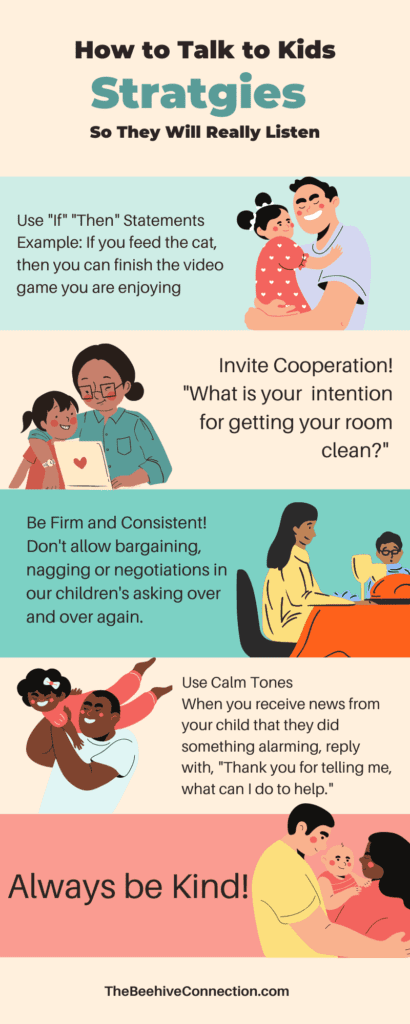
Related Reading
- Benefits of Family Fun Night and Ideas
- Tips for a Happier Home Life
- Ideas for Movie Night
- 47 Game Night Ideas
- 5 Important Parenting Tools
GET FREE ACCESS TO OUR LIBRARY OF FREE PRINTABLES AND RESOURCES!
Enter Your Name and Email for FREE Access to our Library of FREE Home and Family Printables Series!

